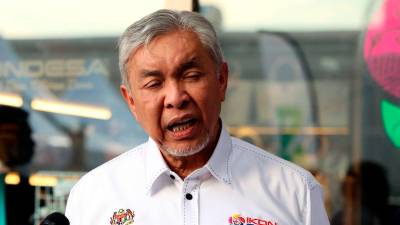PUTRAJAYA: Deputy Prime Minister Datuk Seri Dr Ahmad Zahid Hamidi has expressed grave concern over drug addiction now claiming children as young as ten in primary schools.
He described this development as a critical threat demanding immediate national attention.
Ahmad Zahid pointed to a particularly insidious tactic of dealers offering free sweets laced with drugs to lure in young children.
“I have discussed this matter with the Ministry of Education and preschool institutions to curb this problem,” he said in a recent exclusive interview with Bernama.
He stressed that tackling this issue requires the collective efforts of teachers, parents and the entire community.
Ahmad Zahid, who chairs the Cabinet Committee on Eradication of Drugs, said various initiatives are being implemented to tackle the larger-scale issue.
These efforts include learning more effective methods to combat drug trafficking alongside prevention and rehabilitation work.
Consequently, he said enforcement agencies like the National Anti-Drugs Agency must adopt more creative approaches.
This creativity is particularly needed in detecting drug smuggling and monitoring new trends such as the use of delivery services.
“Sometimes the packages are disguised to look like an ordinary online purchase, but they contain drugs,” he explained.
“They are highly creative in this regard, and I believe our enforcement and rehabilitation agencies have to be even more creative than they are.”
Ahmad Zahid highlighted that drug abuse in Malaysia is a cross-racial issue.
The highest addiction rates are found in the states of Kelantan, Terengganu, Perlis and Kedah.
“In the realm of drug crimes, it is a ‘truly Malaysian’ problem,” he explained.
“The major traffickers are Chinese, the organised distributors are Indian, and the retail-level dealers are Malay.”
He revealed that the situation has reached a critical level with a 32.5% increase in addicts recorded in 2024 compared to the previous year.
The statistics show a sharp rise from 436 addicts per 100,000 people in 2023 to 586 in 2024.
For the current year up to June, the figure stands at 396 addicts per 100,000 people.
To ensure accountability in enforcement, rehabilitation and prevention, Ahmad Zahid stated that the National Anti-Drugs Agency is developing a new strategic plan for 2026-2030.
This plan will be driven by annual Key Performance Indicators set by the Ministry of Home Affairs and guided by its Strategic Plan 2020-2025.
He outlined several minimum indicators for measuring the success of the war on drugs.
One key benchmark is the Anti-Drug Index, which recorded a score of 68.3% based on a 2024 study by Universiti Teknologi Malaysia.
“Other key benchmarks are client recovery rates, the number of recovered individuals who successfully gain employment, the level of public awareness measured by the Community Empowerment Recovery Index, and cooperation with government departments, community leaders, and NGOs,” he added.
On a separate note, Ahmad Zahid shared his previous experience serving as Home Minister.
During his tenure, the national prison population was successfully reduced from 78,000 to 42,000 through the implementation of retraining programmes within prisons.
“I do not believe prisons should be solely for punishment, but rather correctional centres,” he said.
“We trained inmates in economic activities, successfully generating 35 million ringgit in sales revenue.”
More importantly, the recidivism rate was slashed from 48% to just 2.6%.
“That experience proves that with creativity, skills training and economic opportunity, the drugs and related crime issues can be addressed effectively,” he concluded. – Bernama
